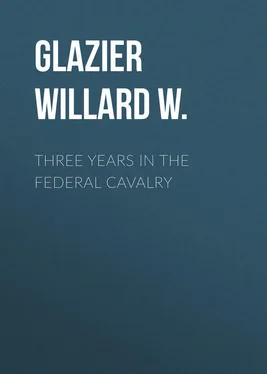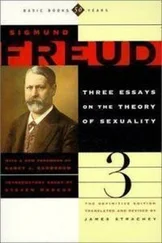Willard Glazier - Three Years in the Federal Cavalry
Здесь есть возможность читать онлайн «Willard Glazier - Three Years in the Federal Cavalry» — ознакомительный отрывок электронной книги совершенно бесплатно, а после прочтения отрывка купить полную версию. В некоторых случаях можно слушать аудио, скачать через торрент в формате fb2 и присутствует краткое содержание. Жанр: История, foreign_antique, foreign_prose, short_story, на английском языке. Описание произведения, (предисловие) а так же отзывы посетителей доступны на портале библиотеки ЛибКат.
- Название:Three Years in the Federal Cavalry
- Автор:
- Жанр:
- Год:неизвестен
- ISBN:нет данных
- Рейтинг книги:4 / 5. Голосов: 1
-
Избранное:Добавить в избранное
- Отзывы:
-
Ваша оценка:
- 80
- 1
- 2
- 3
- 4
- 5
Three Years in the Federal Cavalry: краткое содержание, описание и аннотация
Предлагаем к чтению аннотацию, описание, краткое содержание или предисловие (зависит от того, что написал сам автор книги «Three Years in the Federal Cavalry»). Если вы не нашли необходимую информацию о книге — напишите в комментариях, мы постараемся отыскать её.
Three Years in the Federal Cavalry — читать онлайн ознакомительный отрывок
Ниже представлен текст книги, разбитый по страницам. Система сохранения места последней прочитанной страницы, позволяет с удобством читать онлайн бесплатно книгу «Three Years in the Federal Cavalry», без необходимости каждый раз заново искать на чём Вы остановились. Поставьте закладку, и сможете в любой момент перейти на страницу, на которой закончили чтение.
Интервал:
Закладка:
The cavalry was ordered to "stand to horse," and a strong picket was thrown out to prevent any surprise attack or flanking movement of the enemy. In the early part of the evening one of our pickets was surprised by the friendly approach of a citizen of Falmouth, who had come, as he said, "to hail once more the 'old star-spangled banner,' and to greet his loyal brethren of the North."
Such a patriotic and fearless individual among the white population of that section of country was a great rarity, and his protestations of friendship were at first received with some suspicion. He was, however, brought to General Augur's headquarters, where he gave satisfactory proof of his kind intentions, and then gave the General a full description of the position and strength of the enemy.
A plan for a night attack was thereupon laid and committed to Bayard and Kilpatrick. Our instructions were conveyed to us in a whisper. A beautiful moonlight fell upon the scene, which was as still as death; and with a proud determination the two young cavalry chieftains moved forward to the night's fray. Bayard was to attack on the main road in front, but not until Kilpatrick had commenced operations on their right flank by a detour through a neglected and narrow wood-path. As the Heights were considered well nigh impregnable, it was necessary to resort to some stratagem, for which Kilpatrick showed a becoming aptness.
Having approached to within hearing distance of the Rebel pickets, but before we were challenged, Kilpatrick shouted with his clear voice which sounded like a trumpet on the still night air.
"Bring up your artillery in the centre, and infantry on the left."
"Well, but, Colonel," replied an honest, though rather obtuse captain, "we haven't got any inf – "
"Silence in the ranks!" commanded the leader. "Artillery in the centre, infantry on the left."
The pickets caught and spread the alarm, and thus greatly facilitated our hazardous enterprise.
"Charge!" was the order which then thrilled the ranks and echoed through the dark, dismal woods, and the column swept up the rugged Heights in the midst of blazing cannon and rattling musketry. So steep was the ascent that not a few saddles slipped off the horses, precipitating their riders into a creek which flowed lazily at the base of the hill; while others fell dead and dying, struck by the missiles of destruction which at times filled the air. But the red field was won; and the enemy, driven at the point of the sabre fled unceremoniously down the Heights, through Falmouth, and over the bridge which spanned the Rappahannock, burning the beautiful structure behind them to prevent pursuit. Quite a number of prisoners and various materials of war fell into our hands. Kilpatrick and Bayard were both highly complimented for their personal bravery on the occasion.
April 18. – This morning, at eight o'clock, General Augur took peaceful possession of Falmouth; and here, with military honors, the remains of Lieutenant Decker and about fifteen others, who fell in the late struggle, were interred. Later in the day, and after considerable hesitation, the mayor of Fredericksburg formally surrendered the city to the Yankee General, whose guns on Falmouth Heights commanded obedience.
A bridge of canal boats, similar to a pontoon, was constructed across the river, and we took possession of this beautiful, proud city. This was the first appearance of Yankees in this Rebel locality, and we were the subject of no little curiosity. Many of the people, who, by the misrepresentations of their licentious press and flaming orators, had been led to believe that Yankees were a species of one-eyed cyclops, or long-clawed harpies, or horned and hoofed devils; who had been deceived into the notion that President Lincoln was a deformed mulatto, degenerated into a hideous monkey, and that all his followers were of that sort, on seeing us, expressed great surprise and wished to know "if we were specimens of the Lincoln army." They had forgotten that our fathers fought side by side in our common country's early struggles, and that now we, their children, as brothers, ought all to sit unitedly under the tree of liberty which they had planted in tears and nourished with blood.
But it is painful to observe how the spirit of secession has blotted out the memories of past days and deeds, and filled their hearts with bitterness toward us. A few Union families in these parts, whose acquaintance we have made, assure us that their neighbors, who were formerly most hospitable and humane, have become, through this Rebel virus, incarnate fiends. To secede from the Union was evidently to secede from the God of virtue and charity.
April 25. – After spending a few days of tolerable quietness on the banks of the Rappahannock, with our camp near the Phillips House, Falmouth, a most lovely spot, we were to-day ordered out as escort or guard to a train destined for the Shenandoah Valley. Such a job is generally any thing but pleasant to a cavalry force, for the movement is altogether too slow, especially when bad roads are encountered. And in case a team becomes balky or gives out, or a wagon breaks down (incidents which occur frequently), the whole column is in statu quo until the difficulty or disability is removed. And so we are halting, advancing, halting and advancing again, with this monotonous variety repeated ad libitum , while the halts are often longer than the advances. But our slow motion gives us some opportunity to scout the country through which we pass, and to obtain any quantity of rations and forage for man and beast. By this means we are not compelled to consume much, if any, of the contents of our train.
On the twenty-eighth we reached Thoroughfare Gap, through which the Manassas Gap railroad finds its way over the Bull Run mountains. Here we met a force from General Nathaniel P. Banks' army, to whose care we delivered the train. We remained a few days to scout through the country.
On the first of May we started back toward Falmouth, but stopped several days at Bristersburg, a small town, where we spent our time very pleasantly, scouting through the country and living upon its rich products. Here we are very much isolated from the rest of our army. We seldom get a mail or receive any papers, except from rebel sources, and these are so meagre of literary taste and especially of reliable army news, that we dare not put much trust in their representations. However, we are satisfied from what we read, that our grand Peninsular army is making some telling demonstrations toward Richmond, and that the Rebel General Thomas J. Jackson, surnamed "Stonewall," since his famous defeat by General James Shields at Kernstown, near Winchester, is still in the valley.
May 25th. – We reached Falmouth to-day and took possession of our old camping ground in front of the Phillips House. We have but little to do except to graze our horses in the surrounding fields, and to recruit our strength. We also have the usual camp work, namely, policing, drilling, etc. This department is very quiet, though we hear of active movements elsewhere.
On the thirtieth we had a severe rain storm, with thunder and lightning, à la Virginie . The streams were greatly swollen, and mud was abundant, so as to retard movements before Richmond.
June 6. – The Harris Light crossed the Rappahannock and advanced six miles beyond Fredericksburg, where we got only a glimpse of some of Field's cavalry, who had not forgotten us. They kept themselves at a very respectful distance from us, and made themselves "scarce" whenever we made signs of an attack. For several days we bivouacked on that side of the river, and on the twelfth we returned to our old camp at Falmouth Heights. On the sixteenth we were again thrown across the river, and made a reconnoissance several miles south, without finding any force of the enemy.
Читать дальшеИнтервал:
Закладка:
Похожие книги на «Three Years in the Federal Cavalry»
Представляем Вашему вниманию похожие книги на «Three Years in the Federal Cavalry» списком для выбора. Мы отобрали схожую по названию и смыслу литературу в надежде предоставить читателям больше вариантов отыскать новые, интересные, ещё непрочитанные произведения.
Обсуждение, отзывы о книге «Three Years in the Federal Cavalry» и просто собственные мнения читателей. Оставьте ваши комментарии, напишите, что Вы думаете о произведении, его смысле или главных героях. Укажите что конкретно понравилось, а что нет, и почему Вы так считаете.












